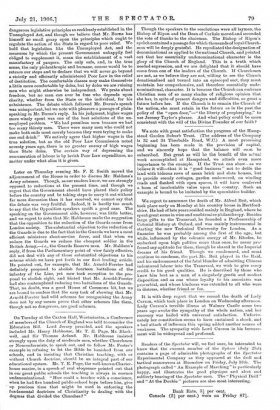We cannot profess to feel anything but dissatisfaction at Mr.
Burns's proposals, though we realise the difficulty in which he and the Government are placed owing to the dangerous legislative principles so recklessly established in the Unemployed Act, and though we believe that Mr. Bums has himself no small grasp upon the principles which ought to regulate the action of the State in regard to poor relief. We hold that legislation like the Unemployed Act, and the measures by which the present Government unhappily feel obliged to supplement it, mean the establishment of a vast manufactory of paupers. The only safe, and, in the true sense, the only philanthropic and humane, course would be to retrace our steps and to declare that we will never go beyond a strictly and efficiently administered Poor Law in the relief of destitution. The comfortable classes may make themselves a little more comfortable by doles, but by doles we are ruining men who might otherwise be independent. We prate about freedom, but no man can ever be free who depends upon charity, whether from the State or the individual, for his subsistence. The debate which followed Mr. Burns's speech was unimportant, but we note with pleasure a passage of plain- speaking in Mr. Burns's reply. In his judgment, higher wages more wisely spent was one of the best solutions of the un- employed problem. "We had penniless men because we had too many thirsty men. There were many men who could not make both ends meet merely because they were trying to make one end drink." We entirely agree that higher wages is the true solution, but as the old Poor Law Commission noted seventy years ago, there is no greater enemy of high wages than State doles. The certain way of depressing the remuneration of labour is by lavish Poor Law expenditure, no matter under what alias it is given.







































 Previous page
Previous page